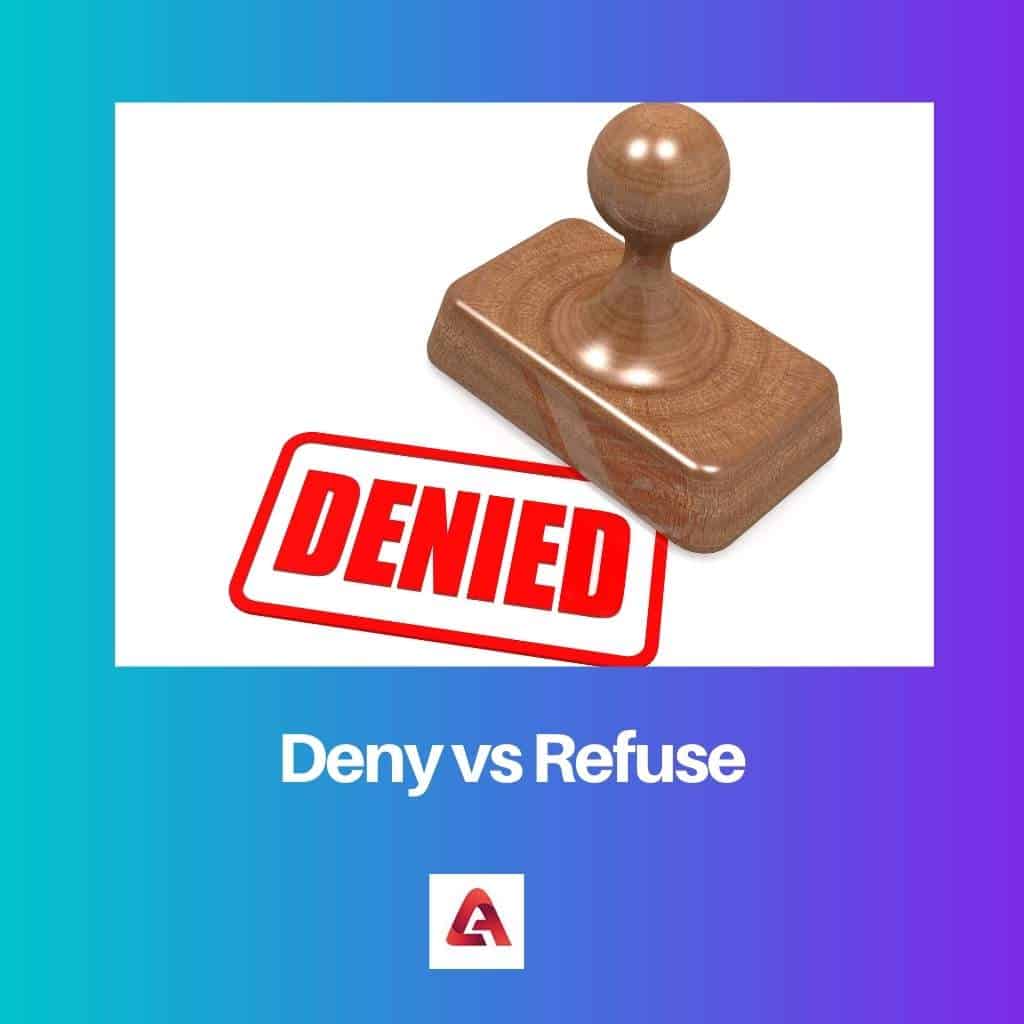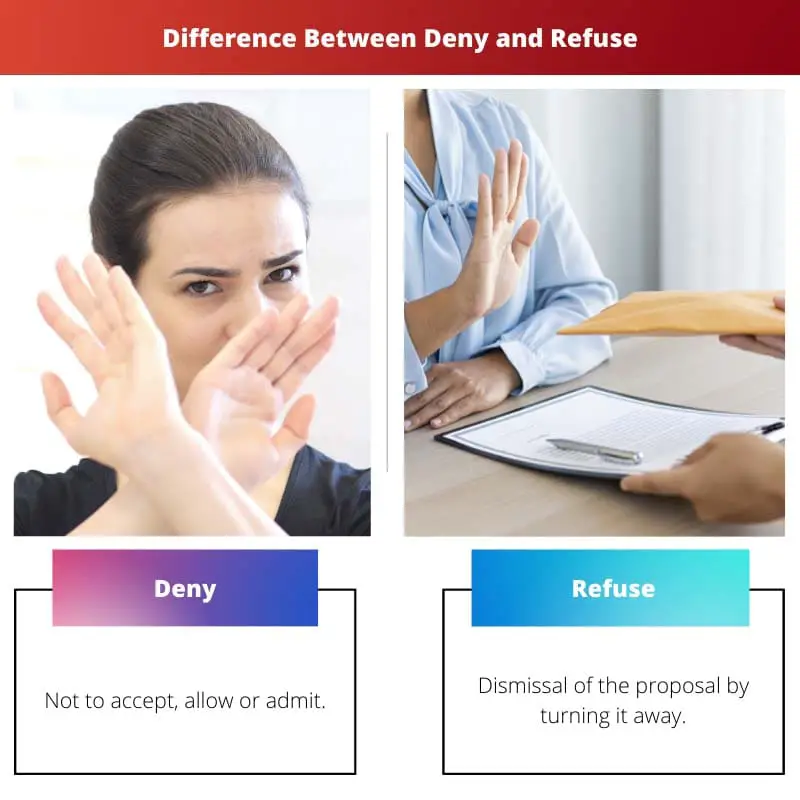The two words deny and refuse both have negative meanings. This is the principal reason why these two words are sometimes used interchangeably. But if someones pay close attention to the meaning of the two and their use of them in sentence formation, then you will understand that they are vastly apart and have numerous differences when compared with each other.
Key Takeaways
- Deny means declaring something untrue or refusing to acknowledge something while refusing means declining or rejecting something.
- Deny is used to deny an accusation or access to something, while refuse is used to refuse an offer or request.
- Deny implies that something is false or incorrect, while refuse implies a personal decision to decline something.
Deny vs Refuse
The difference between Deny and Refuse is that they differ in terms of their word meaning and the way they are applied in the sentence. The definition of denying is to not accept, whereas the meaning of refuse is to turn away or dismiss the proposal when offered. And in terms of application in a sentence, Deny is a verb in nature, whereas refuse can be used as a verb as well as a noun in a sentence.

Deny is a word that is used in the form of a verb when applied to a statement. The fundamental definition of Deny is non-acceptance or not allowing or not admitting. The word is used specifically when someone needs to react to someone or some particular situation in a negative way.
Refuse is a word that can be used both as a verb as well as a noun. The word’s literal meaning is the dismissal of a proposal by turning it away. The application of this word is made when someone is trying to respond to someone specifically in a negative manner.
Comparison Table
| Parameters of Comparison | Deny | Refuse |
|---|---|---|
| Word Meaning | Not to accept, allow or admit | Dismissal of the proposal by turning it away |
| Application | Verb | Noun as well as Verb |
| Word Application | Used in order to respond to someone or react to a situation in a negative way. | Used in order to respond to someone specifically, in a negative manner. |
| Opposite Word | Admit or confess | Accept |
| Succeeding part | Does not require a statement to follow | It is necessary to have a proposition to follow after the use of refuse. |
What is Deny?
Deny is a word that can be used in the form of a verb in a sentence that has multiple usages. Some of them are the following examples:
- A method to emphasize something that is incorrect- for example, ‘She denied all the allegations against her.’
- An approach to decline to have any knowledge about something- for example, ‘She denied of having any knowledge about the hideout of the terrorists.’
- A term to not allow- for example, ‘I wanted to eat ice cream, but I was denied.
The main or principal meaning of Deny is non-acceptance or not allowing or not admitting. The term is used particularly when an individual wants to respond to someone or some selective circumstance in a negative fashion.
The antonym or opposite word of Deny is ‘Admit or confess’. When Deny is used in a sentence, it does not require a statement to follow up after the main sentence in which the word had been used.
A few synonyms of Deny are as follows:
- contradict
- withsay
- gainsay
Learning basic factors in contexts to utilize the terms helps in selecting the appropriate option. The word itself has its root in the Latin origin word, ‘denegare’. The latter means “to deny, refuse, reject.”

What is Refuse?
Refuse is a word that can be used in the form of a verb as well as a noun when applied in a sentence. The literal meaning of the word ‘Refuse’ is the dismissal of the offer by turning it away. This specific term is used when one needs to respond to a particular someone in a negative manner or tone.
The antonym or the opposite of the Refuse is Accept. Knowing the antonym of a particular word helps in understanding the real meaning of the word in-depth. Moreover, when refuse is used in a sentence, it is very important part to have a proposition to follow after the use of refuse. Furthermore, Refuse is always followed by a preposition, and the maximum number of times it is the preposition ‘to’.
The synonyms of Refuse are veto, turn down, and say no to.
Refuse is a portion of a negative narrative or sentence. Refuse has a secondary application as the waste you discard or rubbish.
One can accept both the intellectual sensibility and a particular truth while the word is in use. The following are a few sentences in which Refuse has been used, keeping its meaning and application true to its nature:
- The workers will refuse to work if this situation is not solved.
- I refuse to agree to the fact that he is the thief.

Main Differences Between Deny and Refuse
- The word or literal meaning of the word denies neither to accept nor allow nor admit, whereas the literal meaning of refuse is the dismissal of the proposal by turning it away.
- The application of the word deny in a sentence is in the form of a verb, whereas the application of refuse in a sentence is either in the form of a verb or as a noun.
- The application of the word deny is made in order to respond to someone or react to a situation in a negative way, whereas the use of word refuse is used in order to respond to someone specifically in a negative manner.
- The opposite word or the antonym word for denying is ‘admitted or confess’, whereas, in the case of refuse, it is ‘accept’.
- When the word Deny is used, there is no requirement to have a succeeding statement, whereas it is an essential part of a sentence formation to have a proposition succeeding after the use of refuse.




